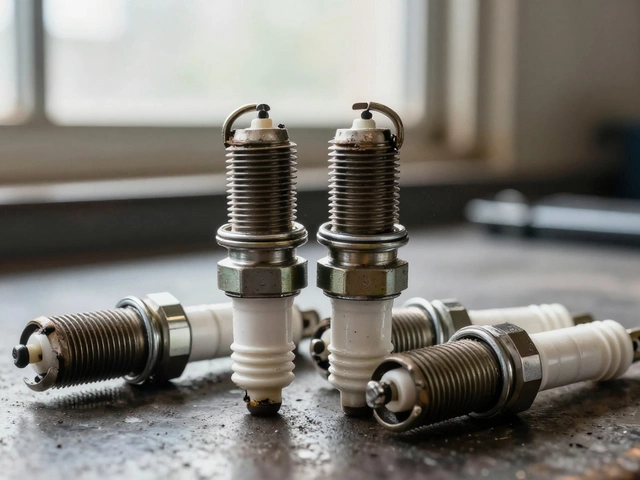
Ever wondered what happens when your car runs out of oil? It's not just about a warning light on your dashboard. When oil levels drop too low, you're putting your engine at risk of serious damage. Imagine driving without knowing that your engine's lifeblood has just disappeared. Scary, right?
Engine oil isn't just there for lubrication—it reduces friction, cools engine components, and keeps things running smoothly. Without it, parts grind together, generating heat and potentially causing permanent damage. Pretty important stuff, if you ask me.
Knowing the signs your car gives you when it's low on oil can save you a lot of trouble. Listen for loud engine noises, like knocking or ticking sounds. These are your car's way of saying, "Help!" Keep an eye out for the oil pressure warning light, an obvious but sometimes ignored signal. Trust me, the quicker you spot these signs, the better.
- The Role of Engine Oil
- Signs Your Car Is Low on Oil
- Consequences of Running Out of Oil
- Preventive Measures
- What to Do If You Run Out of Oil
- Tips for Regular Oil Maintenance
The Role of Engine Oil
Engine oil plays the role of the unsung hero under your car's hood. Without it, your car engine would face relentless heat and friction from all those moving parts. Oil's job is to lubricate these parts, making sure everything spins and moves smoothly.
Car engine oil isn't just about lubrication. It also helps cool the engine. As oil circulates, it picks up excess heat, moving it away from those high-stress areas where the heat builds up. It acts like a friendly firefighter, keeping things from overheating.
Keeping the Engine Clean
Think of oil as the engine's housekeeper. Over time, your engine collects dust, debris, and even tiny metal shards. Oil picks up these particles, keeping them suspended until the oil gets changed. This prevents gunk from building up inside, which would otherwise mess with the engine's efficiency.
Additionally, oil prevents corrosion. Modern oils often contain additives that act against oxidation. This keeps engine components in good shape, extending the engine's lifespan. These additives are a big reason why regular oil maintenance ensures your car can keep driving smoothly.
Supporting Overall Engine Health
Oil also forms a seal. It fills small gaps between the piston rings and cylinder walls, preventing unwanted air or contaminants from getting inside. It's a multitasking superstar, ensuring efficient combustion and preventing leaks.
| Engine Part | Effect of Proper Oil Use |
|---|---|
| Pistons | Reduced friction, increased lifespan |
| Crankshaft | Cooling support, wear prevention |
| Valves | Cleanliness, smooth operation |
In short, without the right level of oil, there's trouble brewing under the hood. Regularly checking and changing your car's oil keeps it running like a champ, avoiding breakdowns and costly repairs. Not bad for a bit of lubricating liquid, right?
Signs Your Car Is Low on Oil
Running low on engine oil isn't something you want to ignore. Your car tries to warn you with clear signs. Knowing these can save you from a lot of headaches and expensive repairs.
Loud Engine Noises
One of the first things you'll probably notice is a change in how your engine sounds. Little knocking or ticking noises coming from under the hood aren't just annoying—they're a cry for help. These sounds happen because metal parts are clanging together without proper lubrication.
Oil Pressure Warning Light
This one is hard to miss: the oil pressure warning light on your dashboard. It's easy to ignore a light, but this one is all about protecting your engine. According to John Davis from Motor Week, "Ignoring the oil pressure warning is like ignoring your car's last call for help."
"Modern cars are smart, but they still need a little help from us to keep things running smoothly. Don’t ignore dashboard warning lights." - John Davis, Motor Week
Burning Oil Smell
A burning smell is never good news. If you catch a whiff of oil, it might mean it's leaking onto hot engine parts. This is your car telling you to check the oil level ASAP before things get out of hand.
Blue Exhaust Smoke
Notice blue smoke coming out of the tailpipe? That's not normal. It's a clear sign of oil burning inside the engine. Not only does it affect performance, but it could also mean there's a big repair job looming.
Performance Drops
If you're finding your car isn't quite as peppy as it used to be, low oil could be to blame. Without enough car engine oil, components might start working inefficiently, leading to sluggish performance.
Regularly checking oil levels and being aware of these signs keeps things running smoothly. These simple checks can prevent a complete breakdown and keep your beloved car in top condition.
Consequences of Running Out of Oil
Running out of engine oil isn't just a small hiccup. It's like your car shouting, "Stop!" because things can go downhill fast. When the oil's gone, friction increases drastically, leading to severe heat build-up. It's a perfect recipe for disaster, putting parts like pistons and bearings at risk of breaking apart.
Overheating and Engine Damage
High heat is a big deal. Your engine's like a furnace without a cooling system when oil levels are too low. Overheating can warp engine parts, making them fit improperly. The excess heat causes an effect called "thermal expansion." Ever tried squeezing into pants a size too small? That's what your engine feels, only it's way worse.
An auto repair expert, John Iversen, once said, "An engine without oil is like a human without blood." It really puts things into perspective, doesn't it?
Noisy Operations
Start hearing strange sounds, like loud knocking or ticking? That's a sign of moving parts rubbing against each other without the cushioning effect of oil. It’s as if your car is basically begging you to pay attention.
Costly Repairs
Failing to catch or address low oil levels can lead to the dreaded engine seizure. Picture this: suddenly, your car stops dead, and you're left with either replacing the engine or even the car itself if the damage is too costly.
If you're someone who dreads that sinking feeling when their vehicle starts misbehaving, then take heed. Maintaining your car's oil levels isn't just routine—it's crucial. Keep your rides smooth and stress-free by checking the oil regularly. Missing that quick check can haunt you, not only with loud noises but with a mega bill at the repair shop.

Preventive Measures
Taking care of your car is just like taking care of yourself. Keeping an eye on your car engine oil levels is key to avoiding any nasty surprises on the road. After all, nobody likes to be stuck on the side of the road with a car that won't budge, right?
Regular Oil Checks
One of the simplest things you can do is get into the habit of regularly checking your oil level. Pop the hood, find the dipstick (usually with a bright handle), and check it at least once a month. And whenever you fill up your gas tank—why not give it a look then too?
Stick to Oil Change Intervals
Your car's manual is like a little guidebook to happy motoring. It'll tell you how often to change the oil, and it's wise to stick to those intervals. Missing an oil change can spell trouble and lead to engine damage, so it's worth the effort to be punctual with this maintenance task.
Listen to Your Dashboard
A surprising number of people ignore the warning lights on their dashboards. If that oil level warning light pops up, don’t just wave it off. Treat it like a friend who’s giving you some much-needed advice.
Use the Right Oil Type
Another crucial part of the equation is using the right kind of oil. There are different types of oil: synthetic, conventional, high-mileage, to name a few. Check your owner’s manual to know exactly what’s right for your car.
| Oil Type | Description |
|---|---|
| Synthetic | Flows more smoothly in cold, offers better protection |
| Conventional | Cheaper option, but may require more frequent changes |
| High-mileage | Designed for cars with over 75,000 miles |
By paying attention to these car maintenance practices, you’re safeguarding your ride from unexpected breakdowns. Keep these preventive measures in your routine, and you’re likely to enjoy smoother, worry-free driving.
What to Do If You Run Out of Oil
Finding yourself in the middle of nowhere with a car that's run out of engine oil isn't fun. Don't panic. Here's what you should do instead. First things first, safely pull over to the side of the road. Driving on is just going to make things worse.
Check the Oil Level
Pop the hood and check the oil dipstick. No oil on it? That's a clear sign you're in trouble. Even if you spot just a bit of oil, it's likely not enough to keep things going.
Top Up If Possible
If you have spare engine oil in your trunk, you're in luck. Add it slowly to avoid overfilling. Make sure to use the right type of engine oil for your car.
Call for Help
No oil on hand? It's time to call for roadside assistance. Don't try to drive your car without enough oil—it's not worth the risk of damaging the engine beyond repair.
"Running an engine without oil can lead to catastrophe," says Chris Jones, a veteran mechanic with over 20 years of experience. "You could end up replacing the engine entirely, which isn't cheap."
Prevent It from Happening Again
Once you're back on the road, think about what led you to this point. Regularly check and change your engine oil. Consistency here is essential.
- Check oil levels monthly.
- Look for leaks under your car.
- Keep a quart of oil in your trunk just in case.
A little preparation goes a long way in avoiding the headaches of an oil-less engine.
Tips for Regular Oil Maintenance
Keeping up with car maintenance isn't just about keeping things shiny—it's about making sure your ride doesn't let you down when you least expect it. One key part of that is taking care of your engine oil. Here are a few tips that can keep your car running smoothly.
Regularly Check Oil Levels
First thing's first—get used to checking your oil level. Ideally, you should be doing this about once a month. Just pop the hood and pull out the dipstick. Wipe it clean, stick it back in, and pull it out again to see where the oil level hits. If it's low, top it up to avoid running out of oil unexpectedly.
Follow the Manufacturer's Recommendations
Manufacturers set out specific guidelines for a reason. Check your owner's manual to find out how often you should change your oil. Most cars need an oil change every 3,000 to 5,000 miles, but newer models can sometimes go a bit longer. Ignore this and you might face engine damage sooner or later.
Use the Right Oil
Not all oils are the same, so make sure you're using the type recommended for your vehicle. Viscosity and quality matter if you want optimal performance. On that note, synthetic oils generally offer better protection if you're willing to spend a little extra.
Monitor Oil Quality
Regularly inspect not just the amount, but the condition of the oil. If it's dark and dirty instead of a nice amber, it's time for a change. You don't want to be running your engine with oil that's like sludge.
Consider Seasonal Changes
Temperature can affect oil performance, so think about switching to a different oil if you're in an area with extreme weather. Thicker oils can be better for hot climates, while thinner oils might perform better in the cold. This can extend your engine's life by reducing wear and tear.
Keep these tips in mind, and your car will thank you for it. A little effort here can prevent a lot of trouble down the line. After all, it's easier and cheaper to maintain than to repair.





